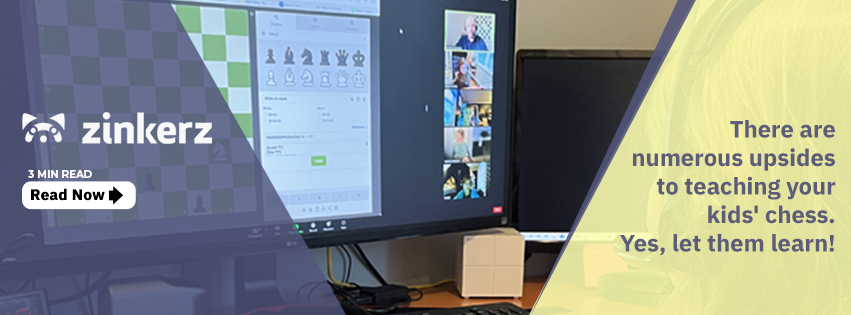As one of the world’s oldest and most iconic board games, countless people enjoy chess across every corner of the globe. Considering its heavy association with strategic thinking and planning, one might believe chess is a complicated game only for the enjoyment of adults. However, this is far from the truth. The basic rules of chess are pretty simple to learn, and players of any age can enjoy the game and excel at it. Studies show numerous benefits to young people learning to play chess. As a company committed to helping students excel in any way possible, Zinkerz is proud to offer one-on-one and group chess classes to young players from elementary to high school. We aim to help students foster a love of this classic game, while also allowing them to develop critical skills that will benefit them far into the future.
Here are just some reasons your child might benefit from learning how to play chess:
It increases critical thinking and problem-solving skills.
Each chess game presents players with unique problems that must be overcome to win the game. As a result, excellent chess players are well known for being able to think critically and problem-solve in decisive circumstances. Whether you have found yourself in an unfavorable situation or are trying to determine the best way to beat your opponent, chess requires stretching your brain muscles and exercising your logic skills. This sort of decisive thinking can give students the tools they need to problem-solve and think critically in other areas of their lives, such as school or sports.
Increases creativity.
Being a game so heavily associated with logic and focus, it may be surprising to learn that a good understanding of chess can enhance one’s creative abilities. However, chess requires players to use their imaginations constantly. Developing a vision for how to triumph over an opponent requires being able to get inside their head and visualize what they might be thinking. Not only that, but playing a successful game can often require imagining infinite play possibilities and creatively determining a path toward success. Students can also develop a keen sense of pattern and spatial awareness through hours of watching opponents’ habits and internalizing how each piece moves across the board.
It improves concentration and memory.
Chess is a game that rewards you for high levels of concentration and punishes you if you lose it. Even a moment of distraction during a match could cost players a crucial piece, or worse, the game itself. Being a game with so many potential moves and outcomes, it is also no surprise that experienced chess players have strong memory skills. Studies have shown that, in particular, skilled chess players indicate higher performance in auditory memory. A 2016 study has even shown that chess has the potential to improve symptoms of ADHD. The importance of focus, so heavily emphasized in chess, can give young players the skills to enhance their focus and memory to benefit them far beyond the game itself.
Teaches strategic planning, thinking ahead, and consequences for actions.
Chess requires players to foresee multiple possibilities and outcomes and consider ways they will respond to them. Good chess players are the ultimate risk managers, carefully calculating moves that need to be made and pieces that may need to be sacrificed to achieve victory. Chess also teaches younger players the importance of making informed decisions and accepting the consequences of their actions—good or bad. Thinking carefully about strategies and moves can reap great benefits for players, while rushing into a move with no sense of foresight can have dire consequences. This can teach younger players the importance of making informed decisions and planning.
It brings people together.
Ultimately, the most crucial part of learning to play chess is its ability to unite people. Chess has a devoted following and is a skill that allows your child to bond with others through different scenarios throughout various eras of their lives. With chess being such a beloved game across so many different cultures and age groups, your child will bond with many other people and develop lasting human connections through friendly, competitive play.
We are interested in seeing how your child benefits from learning to play chess. Sign up for our one-on-one lessons with one of our master educators today. Want your child to play with others their age? Not a problem! Sign up for one of our group classes, or get a group of your child’s friends to join them!



